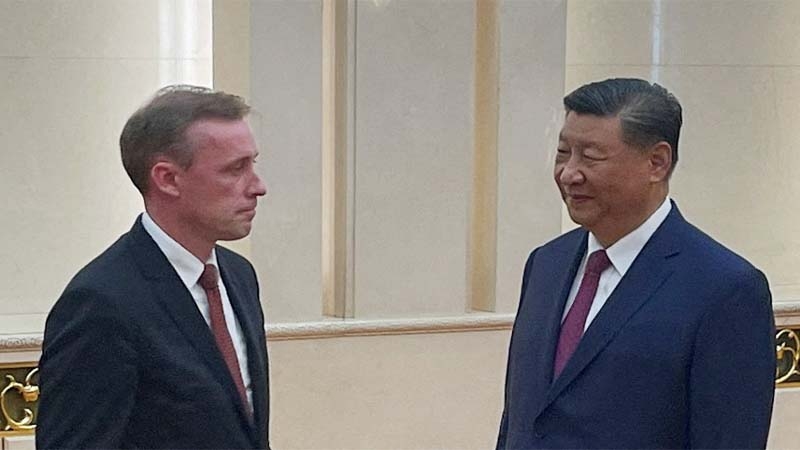- Mojtaba Khamenei Named Iran’s New Leader |
- Iran vows to hit all ME economic hubs if US-Israeli attacks persist |
- Sammilito Islami Bank merger to continue: Governor |
- Biman Suspends Flights to Six Middle East Cities Over Tensions |
- Govt Announces 25pc Rail Fare Discount |
Xi Meets U.S. National Security Adviser Amid Efforts to Avoid Conflict

Chinese President Xi Jinping met with U.S. National Security Adviser Jake Sullivan on Thursday, concluding Sullivan’s three-day visit aimed at maintaining open communication in the increasingly tense U.S.-China relationship.
Sullivan, on his first trip to China as President Joe Biden’s top national security adviser, also held discussions with Chinese Foreign Minister Wang Yi and a senior general from the Central Military Commission. The visit comes as both nations grapple with deepening tensions that date back to a trade war in 2018 and extend to broader issues such as China's territorial claims in the South China Sea and U.S. industrial policy on electric vehicles and solar panels. Sullivan’s mission this week was to prevent those tensions from escalating into conflict.
“We believe that competition with China does not have to lead to conflict or confrontation. The key is responsible management through diplomacy,” Sullivan told reporters at a news conference before departing Beijing.
Both governments are keen to stabilize relations ahead of the U.S. presidential transition in January. They reaffirmed their commitment to managing the relationship, following the groundwork laid during a meeting between Xi and Biden in San Francisco last November.
“While great changes have taken place in the two countries and in China-U.S. relations, China’s commitment to a stable, healthy, and sustainable relationship remains unchanged,” Xi said.
Sullivan echoed this sentiment, emphasizing President Biden’s dedication to managing the relationship responsibly to ensure that competition does not spiral into conflict. He added that both nations would collaborate where their interests align.
One of the outcomes of the visit was an agreement to work towards a phone call between Xi and Biden in the coming weeks. Sullivan hinted that the two leaders could meet in person later this year at the Asia-Pacific Economic Cooperation (APEC) or Group of 20 (G20) summits. “The likelihood is they’ll both be there, and if they are, it would be natural for them to sit down with one another,” Sullivan said.
During their meeting, Xi and Sullivan addressed key issues, including the detention of American citizens in China, tensions over Taiwan, and the ongoing clashes between China and the Philippines in the South China Sea. China’s support for Russia was also a topic of discussion, with a recent U.S. assessment indicating that China was exporting technology to Russia for missile and tank production. Although the two sides discussed efforts to end the war in Ukraine, no significant progress was made on that front.
Sullivan noted that one of the positive outcomes of the talks was an agreement to arrange a call between military commanders in the Indo-Pacific region, which could enhance military-to-military communication ahead of the U.S. presidential transition.
Taiwan, a longstanding flashpoint in U.S.-China relations, featured prominently in the discussions. Beijing claims Taiwan as part of China, but Taiwan, a self-governing island since 1949, rejects unification with the mainland. The U.S. remains obligated by domestic law to provide Taiwan with military hardware and technology to deter a potential invasion.
Sullivan’s meeting with Xi was seen as particularly important because the Chinese leadership views him as a direct extension of President Biden, according to Danny Russel, vice president at the Asia Society Policy Institute and a former National Security Council member during the Obama administration.
Sullivan also met with Gen. Zhang Youxia, vice chair of China’s Central Military Commission, in a rare encounter between a Chinese military leader and a U.S. official. Zhang reiterated that Taiwan’s reunification with the mainland is “the mission and responsibility” of China’s military. A statement from China’s Defense Ministry urged the U.S. to halt military cooperation with Taiwan and cease spreading “false narratives” about the island.
Despite the challenges, Sullivan emphasized the importance of responsibly managing U.S.-China relations. A White House statement highlighted the progress made in restoring military-to-military communication over the past 10 months and noted the agreement to arrange a phone call between theater-level commanders.
China had suspended military communications following then-House Speaker Nancy Pelosi’s visit to Taiwan in August 2022. Gradual restoration of talks began over a year later after Xi and Biden’s meeting in San Francisco.
A theater-level call would involve Adm. Samuel Paparo, head of the U.S. Indo-Pacific Command in Hawaii, and his Chinese counterpart. According to Russel, this dialogue is crucial for crisis prevention but has faced resistance from the Chinese military.
Earlier this week, Paparo indicated that the U.S. military was open to discussions about escorting Philippine vessels in the South China Sea, where they have encountered Chinese ships trying to block their access to disputed islands.

